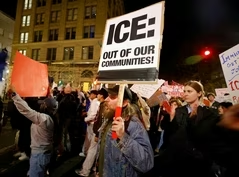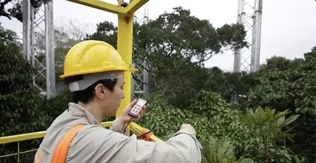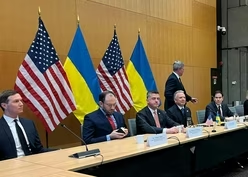
New film tells story of woman who survived Iran prison fire
Clip: 11/23/2025 | 5m 39sVideo has Closed Captions
New film ‘That Night’ tells story of woman who survived fire at infamous Iranian prison
Thousands of Iranian protesters were arrested in the months after the death of Mahsa Amini in 2022, following her arrest for improperly wearing her hijab. Many spent time at the notorious Evin prison in Tehran, where a fire broke out one night. A new short film, “That Night,” shares one survivor’s account of the fire. Ali Rogin speaks with the film’s director Hoda Sobhani for more.
Problems playing video? | Closed Captioning Feedback
Problems playing video? | Closed Captioning Feedback
Major corporate funding for the PBS News Hour is provided by BDO, BNSF, Consumer Cellular, American Cruise Lines, and Raymond James. Funding for the PBS NewsHour Weekend is provided by...

New film tells story of woman who survived Iran prison fire
Clip: 11/23/2025 | 5m 39sVideo has Closed Captions
Thousands of Iranian protesters were arrested in the months after the death of Mahsa Amini in 2022, following her arrest for improperly wearing her hijab. Many spent time at the notorious Evin prison in Tehran, where a fire broke out one night. A new short film, “That Night,” shares one survivor’s account of the fire. Ali Rogin speaks with the film’s director Hoda Sobhani for more.
Problems playing video? | Closed Captioning Feedback
How to Watch PBS News Hour
PBS News Hour is available to stream on pbs.org and the free PBS App, available on iPhone, Apple TV, Android TV, Android smartphones, Amazon Fire TV, Amazon Fire Tablet, Roku, Samsung Smart TV, and Vizio.
Providing Support for PBS.org
Learn Moreabout PBS online sponsorshipALI ROGIN: Woman life, freedom.
It's been the rallying cry of Iranians protesting the Islamic republic since the death of Mahsa Zina Amini in 2022 following her arrest for improperly wearing her hijab.
Thousands of protesters, including women and children, were arrested in the months following Amini's death.
Many spent time at the notorious Evin prison in Tehran.
One night, a fire broke out, threatening the lives of the detained people inside.
Three years later, details of the fire and of the prisoners remained scarce.
But now one survivor has given her account, and it's the subject of a new short film called that night.
I recently spoke with the director, Hoda Sobhani.
Hoda, thank you so much for being here.
This film tells the story of the night of the massive fire at the Evin prison in Tehran through the eyes of your friend who's a survivor of that fire, Neda Naji, why did you feel strongly about telling Neda's story?
HODA SOBHANI, Director, "That Night": Since I was 19, I had many friends who ended up in prison because of the political activities back in Green Movement 2009, and then after that, many other friends.
And Neda was one of my best friends in Iran who ended up in prison.
And I wanted to have the conversation with her so she doesn't carry this pain by herself.
And also, the fire night had very huge impact on her life and my life and many others, and was a big news headline all over the world.
So I was like, this is a very literal story of why Evin prison is a place that the government and regime is using it to oppress more its opponent.
ALI ROGIN: And it's very clear that they don't want information about the prison to get out.
In fact, we see in the film Neda being told by guards, don't talk about this.
Once she's released, she's not supposed to say anything.
And now she's the star of this film.
How did she feel?
Was she scared about speaking out about her experience?
HODA SOBHANI: I would say no, because she's very brave and she, like, I would say, yeah.
It was a few days after she got released we had the first interview because it was very important to remember the details of what happened that night in their cell, in their war.
But when she was inside of Iran, we didn't tell anyone that we are making the film.
And then after a few months, she left Iran to Germany.
And then we started, like, talking publicly about this film.
ALI ROGIN: This film is mostly animated film.
Why did you make that choice?
HODA SOBHANI: It's a very good question.
Because I think animation is one of the artistic forms that we grew up with, and it's the first way we learn to receive stories and learn stories.
And I felt like all of these new authoritarian countries like Iran and many others around the world, we consume news about violence on a daily basis.
It almost becomes the background routine.
And I felt like the animation can help us to lift us out of these constant news headlines.
And these headlines are all trying to turn us into numbers and statistics.
But animation brings back the focus into human story and human experience.
ALI ROGIN: This event, the fire, remains shrouded in so much mystery.
We still don't really know how it started, who was involved.
Why is there still so much that we don't know about the circumstances of the fire?
And do people in Iran talk about this publicly?
HODA SOBHANI: It was different for those who were inside of the prison and those who were outside.
We were seeing videos and footage of fire, and those who were inside were hearing mostly gunfires and tear gas going into their cells.
We are trying to find out how we can get more information about that night and find out the truth about that night.
But because it's prison and there is, like these walls between people, so no one can, like, talk to each other and say what exactly happened.
And there is not a united POV between everyone.
ALI ROGIN: What do you want people watching the film to take away about the Woman, Life, Freedom Movement and also its strength right now?
HODA SOBHANI: First of all, many women in not all of Iran, but many cities, they don't wear mandatory hijab anymore.
But I feel the government is very angry.
The hierarchy and the patriarchal government of Iran is very angry and mad at women, Iranian women.
And they are trying to put back the pressure on a legal system on them, marriage law, or, like, civil rights on them.
But I know that my friends and everyone that I know in Iran, they are trying and they are doing that.
They are finding ways to fight against this system and to ask for their very basic rights.
ALI ROGIN: The film is "That night."
Hoda Sobhani, thank you so much for joining us.
HODA SOBHANI: Thank you so much for having me.
Federal agents escalate immigration crackdown tactics
Video has Closed Captions
Clip: 11/23/2025 | 6m 15s | Federal agents escalate tactics as Trump administration pushes for more migrant arrests (6m 15s)
Scientists build ‘time capsule’ to predict climate future
Video has Closed Captions
Clip: 11/23/2025 | 2m 17s | Deep in the Amazon, scientists build a ‘time capsule’ to predict future of climate change (2m 17s)
Ukraine and allies respond to peace plan at Geneva talks
Video has Closed Captions
Clip: 11/23/2025 | 6m 42s | Officials meet in Geneva for Ukraine talks as peace plan’s author called into question (6m 42s)
Providing Support for PBS.org
Learn Moreabout PBS online sponsorship
- News and Public Affairs

FRONTLINE is investigative journalism that questions, explains and changes our world.

- News and Public Affairs

Amanpour and Company features conversations with leaders and decision makers.












Support for PBS provided by:
Major corporate funding for the PBS News Hour is provided by BDO, BNSF, Consumer Cellular, American Cruise Lines, and Raymond James. Funding for the PBS NewsHour Weekend is provided by...



